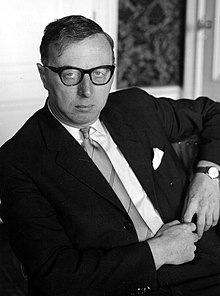Jelle Zijlstra
|
His Excellency Jelle Zijlstra |
|
|---|---|
 |
|
| 34th Prime Minister of the Netherlands | |
|
In office 22 November 1966 – 5 April 1967 |
|
| Monarch | Juliana |
| Deputy |
Jan de Quay Barend Biesheuvel |
| Preceded by | Jo Cals |
| Succeeded by | Piet de Jong |
| President of the De Nederlandsche Bank | |
|
In office 1 August 1967 – 1 January 1982 |
|
| Preceded by | Marius Holtrop |
| Succeeded by | Wim Duisenberg |
| Minister of Finance | |
|
In office 22 November 1966 – 5 April 1967 |
|
| Prime Minister | Jelle Zijlstra |
| Preceded by | Anne Vondeling |
| Succeeded by | Johan Witteveen |
|
In office 22 December 1958 – 24 July 1963 |
|
| Prime Minister |
Louis Beel (1958–1959) Jan de Quay (1959–1963) |
| Preceded by | Henk Hofstra |
| Succeeded by | Johan Witteveen |
| Member of the Senate | |
|
In office 25 June 1963 – 22 November 1966 |
|
| Leader of the Anti-Revolutionary Party | |
|
In office 29 December 1958 – 26 May 1959 |
|
| Preceded by | Sieuwert Bruins Slot |
| Succeeded by | Sieuwert Bruins Slot |
|
In office 23 April 1956 – 3 October 1956 |
|
| Preceded by | Jan Schouten |
| Succeeded by | Sieuwert Bruins Slot |
| Member of the House of Representatives | |
|
In office 20 March 1959 – 26 May 1959 |
|
|
In office 3 July 1956 – 3 October 1956 |
|
| Leader of the Anti Revolutionary Party in the House of Representatives | |
|
In office 3 July 1956 – 3 October 1956 |
|
| Preceded by | Jan Schouten |
| Succeeded by | Sieuwert Bruins Slot |
| Minister of Economic Affairs | |
|
In office 2 September 1952 – 19 May 1959 |
|
| Prime Minister |
Willem Drees (1952–1958) Louis Beel (1958–1959) |
| Preceded by | Jan van den Brink |
| Succeeded by | Jan de Pous |
| Personal details | |
| Born |
Jelle Zijlstra 27 August 1918 Oosterbierum, Netherlands |
| Died | 23 December 2001 (aged 83) Wassenaar, Netherlands |
| Nationality | Dutch |
| Political party |
Christian Democratic Appeal (from 1980) |
| Other political affiliations |
Anti Revolutionary Party (until 1980) |
| Spouse(s) | Hetty Bloksma (m. 1946-2001; his death) |
| Children | 3 daughters and 2 sons |
| Alma mater | Erasmus University Rotterdam (Master of Economics, Doctor of Philosophy) |
| Occupation |
Politician Economist Banker Corporate director Author Professor |
| Religion | Reformed |
| Awards |
Order of the Netherlands Lion (Knight Grand Cross) Order of Orange-Nassau (Knight Grand Cross) |
| Military service | |
| Allegiance |
|
| Service/branch | Royal Netherlands Army |
| Years of service | 1939–1940 |
| Rank |
|
| Battles/wars | |
Jelle Zijlstra (Dutch pronunciation: [ˈjɛlə ˈzɛilstraː]; 27 August 1918 – 23 December 2001) was a Dutch politician of the now defunct Anti-Revolutionary Party (ARP), which merged into the Christian Democratic Appeal (CDA) in 1977. He served as Prime Minister of the Netherlands from 22 November 1966 until 5 April 1967.
An economist by occupation, he became a professor of Economics at the Vrije Universiteit at the age of thirty in 1948. Zijlstra was asked to become Minister of Economic Affairs after the Dutch general election of 1952 in the second Drees cabinet under Prime Minister Willem Drees of the Labour Party, he resigned as a professor the same day he took office as the new Minister of Economic Affairs on 2 September 1952. Zijlstra became the lijsttrekker (top candidate) of the Anti-Revolutionary Party for the Dutch general election of 1956 and served as party leader from 23 April 1956 to 3 October 1956, and as the parliamentary party leader of the Anti-Revolutionary Party in the House of Representatives from 14 June 1956 to 3 October 1956 and a Member of the House of Representatives from 3 July 1956 to 3 October 1956. After a slow cabinet formation the third Drees cabinet was formed and Zijlstra remained Minister of Economic Affairs. The Drees III cabinet fell on 22 December 1958 and a caretaker cabinet was formed by former Prime Minister Louis Beel of the Catholic People's Party. Zijlstra remained as Minister of Economic Affairs and simultaneously served as Minister of Finance in the second Beel cabinet. Zijlstra again became the lijsttrekker for the Anti-Revolutionary Party during the Dutch general election of 1959, and served as party leader of the Anti-Revolutionary Party a second time from 29 December 1958 until 26 May 1959. After a quicker formation the new De Quay cabinet was formed on 19 May 1959. Zijlstra remained Minister of Finance under the new Prime Minister Jan de Quay of the Catholic People's Party, and served until 14 July 1963, when the Marijnen cabinet was installed.
...
Wikipedia
